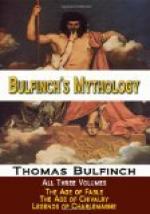Sir Tristram wandered through various countries, achieving the most perilous enterprises, and covering himself with glory, yet unhappy at the separation from his beloved Isoude. At length King Mark’s territory was invaded by a neighboring chieftain, and he was forced to summon his nephew to his aid. Tristram obeyed the call, put himself at the head of his uncle’s vassals, and drove the enemy out of the country. Mark was full of gratitude, and Tristram, restored to favor and to the society of his beloved Isoude, seemed at the summit of happiness. But a sad reverse was at hand.
Tristram had brought with him a friend named Pheredin, son of the king of Brittany. This young knight saw Queen Isoude, and could not resist her charms. Knowing the love of his friend for the queen, and that that love was returned, Pheredin concealed his own, until his health failed, and he feared he was drawing near his end. He then wrote to the beautiful queen that he was dying for love of her.
The gentle Isoude, in a moment of pity for the friend of Tristram, returned him an answer so kind and compassionate that it restored him to life. A few days afterwards Tristram found this letter. The most terrible jealousy took possession of his soul; he would have slain Pheredin, who with difficulty made his escape. Then Tristram mounted his horse, and rode to the forest, where for ten days he took no rest nor food. At length he was found by a damsel lying almost dead by the brink of a fountain. She recognized him, and tried in vain to rouse his attention. At last recollecting his love for music she went and got her harp, and played thereon. Tristram was roused from his reverie; tears flowed; he breathed more freely; he took the harp from the maiden, and sung this lay, with a voice broken with sobs:
“Sweet I sang in former
days,
Kind love perfected
my lays:
Now my art alone displays
The woe that on my being
preys.
“Charming love, delicious
power,
Worshipped from my earliest
hour,
Thou who life on all
dost shower,
Love! my life thou dost
devour.
“In death’s hour
I beg of thee,
Isoude, dearest enemy,
Thou who erst couldst
kinder be,
When I’m gone,
forget not me.
“On my gravestone passers-by
Oft will read, as low
I lie,
’Never wight in
love could vie
With Tristram, yet she
let him die.’”
Tristram, having finished his lay, wrote it off and gave it to the damsel, conjuring her to present it to the queen.
Meanwhile Queen Isoude was inconsolable at the absence of Tristram. She discovered that it was caused by the fatal letter which she had written to Pheredin. Innocent, but in despair at the sad effects of her letter, she wrote another to Pheredin, charging him never to see her again. The unhappy lover obeyed this cruel decree. He plunged into the forest, and died of grief and love in a hermit’s cell.




